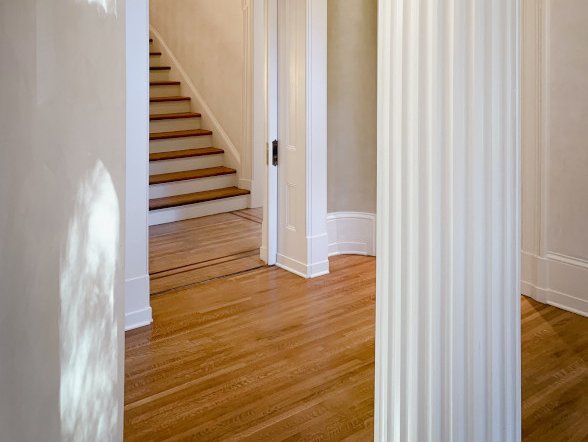
Before Installation
You want a problem-free installation and, to help ensure it, here’s a checklist of things to do before the installer arrives.
Make sure you know who’s removing your existing flooring. If you wish, the installer will do it. If not, you should make arrangements to have it removed.
Who’s moving the furniture? Decide in advance if you want to take on the responsibility or if you want the installer to handle it. Either way, be sure to remove all fragile items from the room.
In general, your Vinyl plank flooring should run parallel to windows or, in narrow rooms, to the longest wall.
Measure door clearances before you have your Vinyl installed. If the new floor is thicker than your existing floor, door bottoms may rub. Plan in advance to have someone shave or saw the correct amount off the bottom of each door so it does not drag.
Paint first. If you’re planning to paint, wallpaper, or do any other remodeling in the room, it’s best to do it before your Vinyl is installed. Keep extra paint to touch up any post-installation nicks.

During Installation
To make your Vinyl floor look good now and for a long time to come, proper installation is critical. Here’s the procedure an experienced installation professional will follow:
- Current flooring: A professional installer will start with a flat surface, which may require extensive prep work—such as removing the existing floor or installing a new subfloor on top of an existing floor. Sometimes, however, Vinyl flooring can be installed directly on top of what you already have. Your installer will have the experience to know the best way to proceed.
- Moisture testing: Vinyl flooring is less sensitive to moisture than hardwood, but the existing subfloor will still need to be tested so that moisture-related problems can be avoided later. • Installation method: In floating floors, as the name suggests, planks are attached to each other, not to the subfloor. Glue-down floors require greater installation skill for the exacting process of adhesive application. As discussed below, room shape can also be problematic.
- Room shape: The configuration of a room can be a challenge, requiring precise measurement, cutting, and placement of flooring—another reason why proper installation by a professional will give you high-quality results.
It’s a good idea to check with us directly to find out if there are other actions we recommend before installation. Just call a member of our friendly sales staff.

